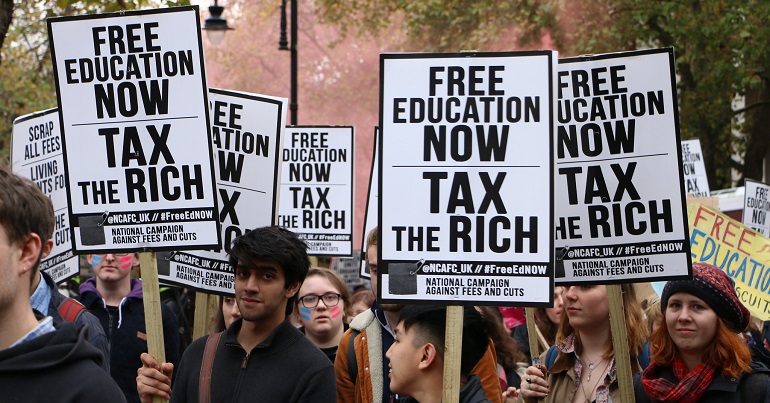1892 And All That
This week, the exclusive Kate Kennedy Club at St Andrews University have announced that from next year they will be accepting membership applications from women.
Until now, the Club’s membership has comprised of 35 young men, mainly from very privileged backgrounds, who organise an annual procession, and a ball at the start and end of each academic year. Club members claim that this is done to preserve the university’s ancient traditions, in particular, commemorating the 35 suitors of Kate, the beautiful niece of Bishop Kennedy. A more sceptical history of the club, which was only founded in 1926, suggests that it was a response to the perceived “feminisation” of universities during and after the First World War. The proportion of female students had increased dramatically in the space of just a few years, and the creation of prestigious, men-only societies was seen as a way of making insecure male students feel important.
In many other universities, an organisation like this would have eventually withered away, but when I first matriculated at St Andrews in 2000, the KK (as they are known to their friends and enemies alike) were still a pretty big deal. Not only were their events the highlight of the social calendar for many students, but the club was honoured by the university: a lavish reception was laid on for them at the end of the annual procession, where the principal would present gifts to the club members.
I wasn’t terribly impressed by the idea of an exclusive, all-male society, and was shocked to discover that there was so little public opposition to the Kate Kennedy Club. They were so accepted as an intrinsic part of the university, that there was a great deal of social pressure on anyone who disagreed to keep their head down. So when I found a flyer advertising a new student society dedicated to challenging gender discrimination, I enthusiastically signed myself up. It was called the 1892 Society, in reference to the year that women were first allowed to graduate on equal terms with men (previously, they had been allowed to attend the university, but couldn’t be awarded a proper degree), and this was where I got my first introduction to activism.
It was all pretty tame really – we handed out flyers at the procession, put up a few posters, and wore home-made badges with “1892” written on them – but by St Andrews standards we looked like rabid extremists. It got us into a lot of arguments, people laughed at us, and on one occasion, a little old woman in a hat expressed her disapproval by ripping up the flyer I’d given her, and throwing it back in my face. My mum was scandalised by our behaviour as well, and I remember getting an ear-stinging lecture over the phone about how I shouldn’t antagonise people who were rich and powerful, because one day I might find myself relying on them to give me a job.
In the space of just ten years, St Andrews has gone from a university that celebrated exclusive, all-male clubs, and banned women from graduating in trousers (the 1892 Society’s one successful campaign was to persuade the university to drop this rule in 2001), to one which has a female principal. It’s a huge step forward that the Kate Kennedy Club have finally decided to let women apply, but it’s really only a partial victory. For one thing, they’ve only said that they’ll let women apply, not that they’ll necessarily ask them join; and if they do extend the invitation any women, they’ll be drawn from the same tight social circle as the men who join. The KK is the highest tier of the St Andrews old boys network, and that’s not going to change now that they’re letting girls in. They deserve some credit for having finally allowed themselves to be dragged kicking and screaming into the twentieth century, but this doesn’t necessarily make them a good, or even harmless, organisation.
These days, the KK isn’t so much about providing a security blanket for male students who feel threatened by the feminism, but for the wealthy students who are a little bit uncomfortable at being surrounded by so many kids from state comprehensives. The first tickets for the famous KK May Ball have recently gone on sale, and at £95 a head (note: these aren’t even the VIP tickets), it’s an event that is used to separate the haves from the have nots. Who you can afford to socialise with at university makes a big difference to your future prospects: unless you can get into parties like this one, you’ve got no chance of making the connections needed to get into some of the most lucrative or desirable careers.
The continued existence of the KK helps to perpetuate social divisions which keep certain doors closed to all but the very wealthy, however, it’s just a symptom of a wider problem in society. Changing their membership criteria is a gesture, and while it suggests that gender discrimination is becoming less socially acceptable, it’s hardly revolutionary.




I really had been searching for ideas for my own web site and located ur
blog post, “1892 And All That | Bright Green”, do you really care in cases where
I actually employ many of ur points? Many thanks
-Juan
Seem to remember the first one of these causing a bit of controversy/hilarity: http://www.youtube.com/watch?v=cmuuX5X9Vzw
“finally allowed themselves to be dragged kicking and screaming into the twentieth century”
That’s pretty much the point, isn’t it? This action would have been radical and forward-thinking in the late nineteenth century, but we’re now living in the twenty-first.
Anyway, as a woman who graduated in trousers a few years ago, thank you for fighting that one for me — although frankly I’m a little shocked that you had to.